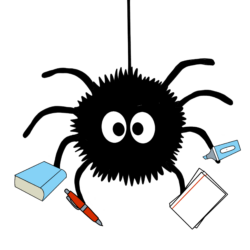
KE Skalka is a graduate of Aberystwyth University. She holds a BA in English and an MA in Welsh Literature. She lives in Wales in an old farm house with a lot of spiders.
What is the difference between Proofreading and Editing?
- Proofreaders correct mistakes in spelling, punctuation and grammar. Good proofreading improves the readability of writing and makes it easier to understand.
- Proofreading can catch factual mistakes, such as putting a city in the wrong country: “Luxembourg, the capital of Germany…”
- Proofreading can catch internal mistakes, such as using different numbers, dates or times: “Joe was the proud father of two children.” Later “… ‘I have twin boys and a girl,’ said Joe.”
- Editors make corrections, like proofreaders, but also suggest more substantial improvements.
- Editors work with the author to restructure and rewrite sentences.
- Editors can suggest improvements to the plot/story, flow, or tone of a text.
Why do I need a Proofreader or Editor?
- It’s very easy to overlook our own mistakes, no matter how carefully we check. You know how the writing should read. That means your brain can see what should be on the page instead of what actually is. It’s strange, but it’s true. Even experienced proofreaders have a second person check their work.
- If you speak English as a second language. You may want a native speaker to ensure your spelling, phrases, and grammar are correct.
- You might not be using the right tone of voice for your work. “A car smashed ass-backwards into a tree” is not right for a professional report. Friends chatting would not say, “A road-traffic incident occurred today when a car reversed into a tree.”
- Your writing might include slang or idioms unfamiliar to a wider audience. You might know that “putting your house in order” means to solve problems; a reader might assume you are referring to cleaning. This is especially true of idioms that are very regional (“come to Jesus moment”) or used by a specific age group (“drip” doesn’t always mean a leaky sink.)
- You might use cliches, stock tropes, or recycled ideas without realising it. If you want to write about an evil car, an editor can help it stand out from the famous evil car novel Christine.
- You might be plagiarising someone else’s work, and that can get you into trouble. A romance novel published in 2008 was padded with text copied verbatim from other sources, including a nature article about ferrets. This led to the author being dropped by their publisher.
BSP Note: Plagiarism is a serious matter that can have serious professional and legal consequences. An editor can assist and advice, but the author is ultimately responsible for the content of their work.

